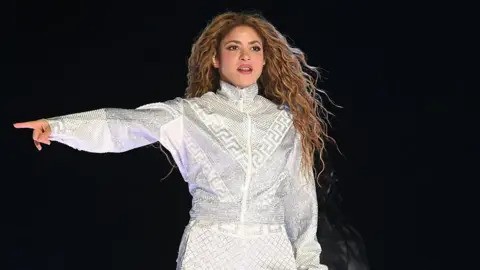Shakira’s 2025 Las Mujeres Ya No Lloran World Tour was expected to be a celebration of resilience, artistry, and the global power of music. Named after her latest album, the tour launched earlier this year in South America with dazzling performances that reintroduced the Colombian superstar to the live stage after a long hiatus. With a massive production team, custom visuals, and intricate choreography, it was poised to be one of the most ambitious tours of the year.
However, as the tour transitioned into its North American leg, unforeseen logistical and safety challenges emerged—culminating in the cancellation of two major U.S. concerts in Boston and Washington, D.C. These cancellations, announced just days apart, sparked widespread disappointment among fans and offered a rare look behind the scenes at the immense complexity of putting on a global pop spectacle.
On May 29, fans gathered in eager anticipation outside Boston’s historic Fenway Park, many of them having traveled hours to see Shakira perform. But excitement quickly turned into confusion when word spread that the show was being canceled.
Live Nation, the event’s promoter, issued a statement the next day explaining that “structural elements were identified as not being up to standard” during routine venue inspections. The decision to cancel was made in the interest of safety. Notably, the issue didn’t just affect Shakira’s tour—upcoming shows from country stars Jason Aldean and Brooks & Dunn were also postponed due to the same venue-related concerns.
The last-minute nature of the announcement caused frustration among concertgoers. Social media was flooded with posts from fans who had made special travel arrangements or spent money on hotels and transportation. While the refund process was set into motion promptly, the emotional letdown was palpable.
Less than 24 hours later, another blow hit fans when Shakira’s scheduled concert in Washington, D.C., for May 31 was also canceled. This particular show had an added layer of significance—it was also billed as the Welcome Concert for WorldPride DC 2025, adding to its visibility and importance.
According to Nationals Park, the stadium where the concert was set to take place, the reason was a logistical one: “Shakira’s full tour production cannot be transported to Washington, D.C. in time for her scheduled performance.” This issue stemmed directly from the Boston cancellation. Because the crew and equipment were still tied up due to safety concerns at Fenway Park, there simply wasn’t enough time to break everything down, transport it, and set it back up for the D.C. performance.

Organizers tried to explore alternatives, but ultimately, the decision was made to cancel entirely. Fans who had purchased tickets through Ticketmaster or Nationals.com were promised automatic refunds. Those who had used third-party sellers were advised to contact those vendors directly for reimbursement.
For her part, Shakira addressed the situation with transparency and grace. She took to social media to share a message directly with her fans:
“Due to circumstances beyond my control, I am sad and heartbroken that I will not be able to be in Washington, D.C. with you tomorrow. I hope that I can come back to D.C. as soon as I am able. Meanwhile, please know that I am eternally thankful for your unconditional support.”
The message struck a chord with many fans, especially those who were equally disappointed by the turn of events but appreciated Shakira’s sincere acknowledgment of the situation. While no rescheduled dates have been announced yet, her words suggested a strong desire to return when conditions allow.
Shakira’s Las Mujeres Ya No Lloran World Tour isn’t just another promotional cycle—it’s a culmination of decades of work and artistic evolution. In a recent interview with USA TODAY, she spoke about the immense amount of preparation that went into designing the tour.

“I’ve worked so much on every detail of this show. I’m building the biggest setlist of my career,” she said. “There are going to be visuals I created, the narrative and the details of them. There are 145 people on this tour to make it happen every night.”
The logistics are staggering. The tour features:
- 13 costume changes
- Original interlude music composed specifically for transitions
- Custom visual storytelling elements
- A narrative arc spanning Shakira’s musical journey
- A 145-member touring crew
These details underscore just how massive an undertaking the tour really is—and how vulnerable such a machine can become if any part of the chain breaks down.
The recent cancellations serve as a stark reminder of how fragile live entertainment can be. Despite meticulous planning, even the largest and most professional productions are subject to forces outside of anyone’s control—be they venue-related safety issues, transportation delays, or broader logistical complications.
Tours of this magnitude rely on military-level coordination. Equipment often includes custom-built stages, lighting rigs, sound systems, and backdrops that must be precisely dismantled and reassembled at each stop. When any link in that chain is delayed or compromised, it can have a ripple effect on subsequent shows.
Fenway Park’s structural issues may seem like a local concern, but they triggered a cascade that affected thousands of people, across multiple cities, with financial and emotional consequences. In a digital age where streaming and remote content have become king, live shows still offer something deeply human—shared physical presence, emotion, energy—and when they fall through, the impact is tangible.
The D.C. cancellation hit particularly hard because of its alignment with WorldPride DC 2025. The Welcome Concert was supposed to be a joyful kickoff for a citywide celebration of LGBTQ+ pride and solidarity. Losing Shakira, a global icon with a diverse and inclusive fanbase, was a disappointment not just for concertgoers, but for the larger community.
Organizers have not yet announced whether a replacement headliner will be booked for the Welcome Concert or whether the program will be restructured. But for many attendees, Shakira’s absence will be difficult to fill. Her music has long resonated with themes of empowerment, resilience, and emotional honesty—ideals that align closely with the spirit of Pride.
Despite the turbulence, Shakira’s commitment to her fans remains unshaken. Her team continues to assess options for rescheduling or adding future dates in both Boston and D.C. And fans, while understandably upset, have shown an outpouring of support online—sharing messages of love, patience, and encouragement.
This is not the first time Shakira has had to navigate challenges mid-tour. Over her decades-long career, she has weathered injuries, political unrest in certain tour regions, and even global pandemics. Her staying power isn’t just rooted in her talent, but in her ability to adapt, persevere, and connect with fans on a deeper level.
The North American leg of Las Mujeres Ya No Lloran officially kicked off on May 13, and many other dates across the U.S. and Canada are still on the calendar. As of now, shows in cities like New York, Miami, Los Angeles, and Chicago are still moving forward as scheduled.
For fans still hoping to catch the tour, it’s advisable to monitor official updates from Shakira’s website, Live Nation, and the venues themselves. If any further changes are expected, they’ll likely be communicated through these channels first.
In the meantime, Shakira continues her tour with the same energy and passion that has defined her career. For her, this tour is more than just a promotional push—it’s a personal mission. As she told USA TODAY, the tour represents “a recap of everything I’ve learned over these years of making music.”
The recent cancellations in Boston and Washington, D.C. are disappointing, but they also reveal the enormous effort, planning, and coordination that go into every performance on a global tour. While fans are understandably frustrated, safety must always come first—especially when thousands of lives are potentially at stake.
Shakira’s emotional response and dedication to making it up to her fans demonstrate the kind of artist she is—one who genuinely values the connection she shares with her audience. As the tour continues, the setbacks serve as a poignant reminder of how much we all crave human connection through music, and how even the biggest stars face unexpected roadblocks on the path to creating magic on stage.



